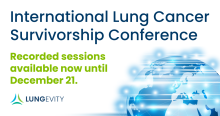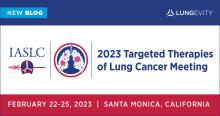Watch Recorded Expert Sessions From ILCSC
The International Lung Cancer Survivorship Conference (ILCSC) is a free virtual educational conference for people with lung cancer, caregivers, and advocates. The 2023 conference was held September 22-23. The recorded sessions from this conference are available to registered participants through December 21, 2023, at www.lungevity.org/ilcsc. If you did not register for the conference but would like to view the recordings, you may still register for free access. The recordings are available until December 21. The recordings provide opportunities for attendees to hear from world-renowned










